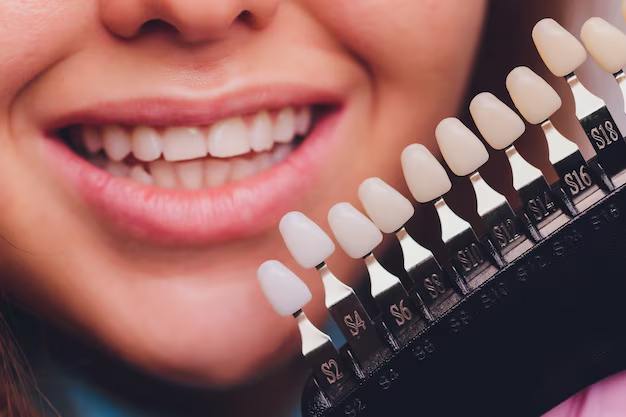Porcelain veneers are a popular cosmetic dental treatment that can dramatically improve the appearance of your smile. These thin, custom-made shells are designed to cover the front surface of your teeth, providing a natural-looking solution for various dental imperfections. Whether you want to correct discoloration, chips, gaps, or misalignment, porcelain veneers offer a durable and aesthetic solution. In this guide, we will explore what porcelain veneers are, how they work, the benefits, the procedure, and compare them to other dental options to help you make an informed decision.
What Are Porcelain Veneers?
Porcelain veneers are thin, custom-made shells that are bonded to the front surface of your teeth. They are made from high-quality porcelain, a material that closely mimics the appearance of natural teeth. These veneers are designed to cover imperfections such as stains, chips, gaps, and minor misalignments.
The process of getting porcelain veneers typically involves multiple visits to a dentist, where the teeth are carefully prepared, impressions are taken, and the veneers are customized to fit the unique shape of your teeth. The final result is a bright, flawless smile that looks both natural and aesthetically pleasing.
The Benefits of Porcelain Veneers
Porcelain veneers offer a wide range of advantages, which is why they are one of the most sought-after cosmetic dental treatments. Some of the key benefits include:
- Aesthetic Improvement: Porcelain veneers can address various imperfections like stained, cracked, or misaligned teeth. They provide a perfect smile makeover with minimal alterations to your natural teeth.
- Durability: Porcelain is a strong, durable material that resists wear and tear. With proper care, porcelain veneers can last for 10 to 15 years or even longer.
- Stain Resistance: Porcelain veneers are highly resistant to stains, making them an excellent choice for individuals who have difficulty maintaining white teeth due to food and beverage consumption.
- Natural Appearance: The translucency of porcelain closely resembles natural teeth, creating a highly realistic and natural-looking smile.
- Minimally Invasive: The procedure for getting porcelain veneers requires minimal alteration to the natural tooth structure compared to other cosmetic dental treatments, making it a less invasive option.
- Quick Results: While the procedure involves multiple steps, the results are noticeable almost immediately. Patients can walk out of the dental office with a brand-new smile after just a few visits.
The Porcelain Veneer Procedure
The process of getting porcelain veneers typically involves the following steps:
Initial Consultation
The first step in the process is a consultation with your dentist. During this visit, your dentist will evaluate your oral health, discuss your cosmetic goals, and determine if porcelain veneers are the right solution for you. The dentist will also take X-rays and photographs of your teeth to create a treatment plan.
Tooth Preparation
In most cases, your dentist will need to remove a small amount of enamel from the surface of your teeth to ensure that the veneers fit properly. This step is necessary to make room for the thin shells and ensure a secure bond. The amount of enamel removed is minimal, and local anesthesia may be used to ensure that the procedure is comfortable.
Impressions
After the teeth are prepared, your dentist will take impressions of your teeth. These impressions are sent to a dental laboratory where your custom porcelain veneers are created. The process typically takes about 1 to 2 weeks, during which time you may be given temporary veneers to wear.
Veneer Bonding
Once the porcelain veneers are ready, your dentist will carefully bond them to the front surface of your teeth. The bonding process involves cleaning and etching the surface of your teeth to ensure a strong adhesive bond. The veneers are then placed, and any necessary adjustments are made to ensure a perfect fit. Your dentist will ensure that the veneers align with your bite and look natural.
Final Touches
After the veneers are bonded, your dentist will make any final adjustments, such as polishing the veneers to give them a glossy finish. Once the procedure is complete, you will leave the office with a new smile.
How Long Do Porcelain Veneers Last?
Porcelain veneers are designed to be durable and long-lasting, typically lasting between 10 and 15 years with proper care. However, their lifespan can vary depending on factors such as oral hygiene habits, diet, and whether you engage in habits like teeth grinding. To maximize the longevity of your veneers, it is essential to maintain good oral hygiene, avoid biting down on hard objects, and visit your dentist regularly for check-ups.
Porcelain Veneers vs. Composite Resin Veneers
While porcelain veneers are a popular choice for cosmetic dental procedures, another option is composite resin veneers. Both types of veneers serve similar purposes, but they differ in material, durability, cost, and procedure. Here’s a comparison chart to help you understand the key differences:
| Feature | Porcelain Veneers | Composite Resin Veneers |
| Material | High-quality porcelain | Composite resin (tooth-colored filling material) |
| Appearance | Natural-looking and translucent | Less translucent, may appear less natural over time |
| Durability | 10–15 years or more | 5–7 years |
| Stain Resistance | Highly resistant to stains | Less stain-resistant |
| Procedure Time | 2–3 visits, including impressions and bonding | 1–2 visits, usually completed in a single session |
| Cost | Higher cost | More affordable |
| Tooth Preparation | Minimal enamel removal | Minimal to no enamel removal |
| Maintenance | Requires good oral hygiene to prevent issues | Requires regular touch-ups |
While porcelain veneers are more expensive and require more time for customization, they offer superior durability, a more natural appearance, and better stain resistance. On the other hand, composite resin veneers are a more affordable and quicker option, but they may not last as long and may require more maintenance.
Caring for Porcelain Veneers
Porcelain veneers require proper care to maintain their appearance and longevity. Here are some tips for caring for your veneers:
- Good Oral Hygiene: Brush your teeth at least twice a day with a fluoride toothpaste and floss daily to remove plaque and prevent gum disease.
- Avoid Hard Foods: Avoid biting down on hard objects such as ice, pens, or fingernails, as these can damage the veneers.
- Limit Staining Foods and Drinks: Although porcelain is resistant to stains, it’s still a good idea to limit your consumption of staining foods and drinks like coffee, tea, and red wine.
- Wear a Mouthguard: If you grind your teeth at night, consider wearing a nightguard to protect your veneers from damage.
- Regular Dental Visits: Visit your dentist for regular check-ups to ensure your veneers are in good condition and your oral health is maintained.
Is Everyone a Candidate for Porcelain Veneers?
Not everyone is a suitable candidate for porcelain veneers. Ideal candidates are those who have:
- Healthy teeth with no significant decay or gum disease
- Good overall oral hygiene
- Sufficient enamel to support the veneers
- Cosmetic dental concerns such as chipped, stained, or misaligned teeth
If you have significant dental issues, such as large cavities, severe gum disease, or a misaligned bite, your dentist may recommend other treatments before proceeding with veneers.
Potential Risks and Side Effects
While porcelain veneers are generally safe and effective, there are a few risks and potential side effects to be aware of:
- Tooth Sensitivity: Some people experience increased tooth sensitivity after getting veneers, especially to hot or cold foods. This sensitivity typically subsides after a few days or weeks.
- Chipping or Cracking: Although porcelain is durable, it is not indestructible. If you bite down on something hard, your veneers may chip or crack.
- Irreversible Procedure: Since a small amount of enamel is removed during the preparation phase, the process is irreversible. Once you get veneers, you will always need to have them or some other restoration on your teeth.
Conclusion
Porcelain veneers are an excellent solution for those looking to enhance their smile with a natural-looking, durable, and stain-resistant option. Whether you’re dealing with chips, gaps, stains, or misalignment, porcelain veneers can provide a transformative result. The procedure is minimally invasive, and with proper care, veneers can last for many years, making them a worthwhile investment for your smile.
Before deciding to undergo the procedure, it’s essential to consult with a skilled cosmetic dentist to determine if porcelain veneers are the right choice for you. With the right care and maintenance, you can enjoy a beautiful, flawless smile for years to come.

